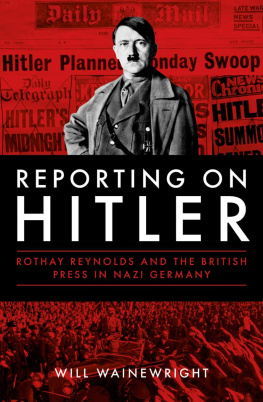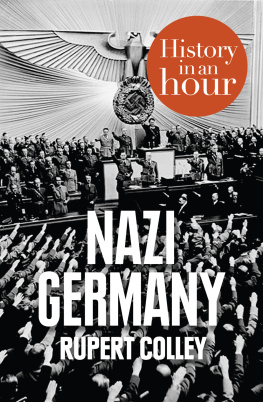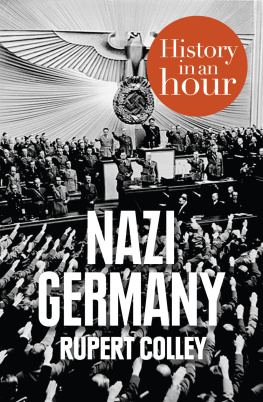
Germany: Jekyll and Hyde
An eyewitness analysis of Nazi Germany
by Sebastian Haffner
Translated from the German
by Wilfrid David
W ith an introduction by Neal Ascherson
Published by Plunkett Lake Press, November 2012
www.plunkettlakepress.com
Estate of Sebastian Haffner
Introduction Neal Ascherson, 2005
Cover: Susan Erony and Erika Marquardt; Have We Gone Too Far ; one of one-thousand paintings; mixed media on canvas framed in lead; 5 x 7; 1998-2008
First published in Great Britain in 1940 by Seeker and Warburg
Second edition, 2005 by Libris
Paperback edition , 2008 by Abacus
~ Other eBooks from Plunkett Lake Press ~
Also by Sebastian Haffner
The Ailing Empire: Germany from Bismarck to Hitler
The Meaning of Hitler
The Rise and Fall of Prussia
By Sholom Aleichem
From the Fair
By Helen Epstein
Children of the Holocaust
Joe Papp: An American Life
Music Talks: The Lives of Classical Musicians
Where She Came From: A Daughters Search for Her Mothers History
B y Anthony Heilbut
Exiled in Paradise: German Refugee Artists and Intellectuals in America from the 1930s to the Present
B y Eva Hoffman
Lost in Translation
By Peter Stephan Jungk
Franz Werfel: A Life in Prague, Vienna, and Hollywood
By Egon Erwin Kisch
Sensation Fair: Tales of Prague
By Heda Margolius Kovly
Under A Cruel Star: A Life in Prague, 1941-1968
By Peter Kurth
American Cassandra : The Life of Dorothy Thompson
By H illel Levine
In Search of Sugihara: The Elusive Japanese Diplomat Who Risked His Life to Rescue 10,000 Jews from the Holocaust
By H illel Levine and Lawrence Harmon
The Death of an American Jewish Community : A Tragedy of Good Intentions
By Jan Masaryk
Speaking to My Country
By Susan Quinn
A Mind of Her Own: The Life of Karen Horney
Marie Curie: A Life
B y Vlasta Schnov
Acting in Terezn
By Susan Rubin Suleiman
Budapest Diary: In Search of the Motherbook
By Joseph Wechsberg
The Vienna I Knew: Memories of a European Childhood
By Friderike Zweig
Married to Stefan Zweig
By Stefan Zweig
Adepts in Self-Portraiture: Casanova, Stendhal, Tolstoy
Amerigo: A Comedy of Errors in History
Balzac
Dostoevsky by Zweig
Freud by Zweig
Joseph Fouch: Portrait of a Politician
Mental Healers : Franz Anton Mesmer, Mary Baker Eddy, Sigmund Freud
The Struggle with the Daemon: Hlderlin, Kleist, Nietzsche
The World of Yesterday
Three Masters: Balzac, Dickens, Dostoevsky
For more information, visit www.plunkettlakepress.com
~ About the author ~
Sebastian Haffner (1907-99) was born in Berlin. He studied law and trained and qualified as a lawyer in Germany in 1933, where he took some divorce cases but mainly worked as a freelance writer until 1938 when he emigrated to England. After the publication of Germany: Jekyll and Hyde, his first book, in 1940, he edited Die Zeitung, the government-supported German-language newspaper in London. In 1942 he joined the Observer for which he wrote leaders and political articles. In 1950 he returned to Berlin as the Observers foreign correspondent, until 1961 when he became a distinguished contributor to the then influential German weekly Stern. Haffner was married and had three children. He died in Berlin.
~ Praise for Germany: Jekyll and Hyde ~
An alarm call trying to awaken the British to the unique nature of Hitler and the Nazi regime... Remarkably prescient J. G. Ballard
Haffners clear-sighted analysis, applied mainly to the dissection of his fellow Germans, annihilates any claim by his contemporaries not to have known about Nazi crimes... Apocryphally, Churchill told his cabinet to read this book so that they would understand the Nazi threat. We should do likewise to understand how close we came to ignoring it Rafael Behr, Observer
A powerful and sustained text... it explodes with rhetorical fireworks. Haffner produces a convincing picture of the Nazis, their numbers, their power and the destructive nihilism that united them Giles MacDonogh, BBC History
~ Contents ~
by Neal Ascherson
Hitler
The Nazi Leaders
The Nazis
The Loyal Population
The Disloyal Population
The Opposition
The migrs
Possibilities
~ Publishers note (2008) ~
This new edition, with an added introduction , reprints the original text, with punctuation lightly emended on some occasions where sense was otherwise obscured.
The subtitle has been added. The notes have been adapted and augmented, with grateful thanks to the staff of the German Historical Institute (London) for their help, from the German edition of the book (translated from the English, as the German original has never been found): Germany Jekyll und Hyde ( Droemersche Verlagsanstalt Th. Knaur , Munich, 1996).
~ Introduction ~
by Neal Ascherson
Sebastian Haffner was the most famous German journalist of his generation. And the title of journalist gave him pride. He was not a belles-lettres man, being less fashion-conscious than Joseph Roth and much more worldly and practical than Karl Kraus. He was not a roving reporter whose scoops could undermine empires, like Egon Erwin Kisch, although while working for the Observer in the nineteen fifties he would from time to time leave London and write from some foreign place. He did so with a special blending of vast reflections with the echo of events unfolding around him; a technique known among his Observer colleagues as bombinating from the field.
I am not sure that Haffner ever wrote, in his countless columns, the sort of essay definable in Central Europe as a feuilleton. His pieces were too exclusively political for the classic feuilleton, and were often too deeply angry. Haffners articles were not read by old literati in fur collars, sitting in cafs. They were read by young women throwing back their hair as they smoothed out Stern on a school radiator, or by grave entrepreneurs in first-class compartments, or by bearded men in cellar bars so engrossed in Haffner that their cigarette burned out in the ashtray.
Neither did he, the author of unforgettable studies of Germanys recent past, claim to be a historian. He considered himself a journalist who wrote history. Everything that he wrote had a function, an aim, which was to press a point of view or to achieve some change. Everything that he wrote had a character of public urgency. This was true even of his first political work, Defying Hitler, the memoir which he wrote fresh in exile in 1939 and then abandoned (the manuscript was found by his son and published sixty-one years later, and became an instant best-seller).
In that book, he apostrophized the reader: I will not mind if, after reading the book, you forget all the adventures and incidents that I recount; but I would be pleased if you did not forget the underlying moral.
He never wrote another book about himself, and seems to have wished that he had not written that one. But the urgency, the habit of regarding his writing as didactic, never left him. It was that commanding tone, often witty but always fundamentally serious, which seized his readers and, much later on, his viewers. For some years in the nineteen sixties, Haffner had a weekly evening slot on the third TV channel in West Berlin. Nobody else could have got away with the format. Haffner, eyes twinkling under his huge forehead, would appear on screen and light a cigar. A cloud of smoke then hid everything, until eyes first he emerged and gave the viewers a small, unkind smile. Then, in his high-pitched voice, he began to speak about whatever mattered to him on the political scene. He spoke on until his cigar burned out, and then a final gush of smoke, another smile the screen went black. How often I watched this experience in crowded student cafs which fell silent, entranced, all cigar long!
Next page








